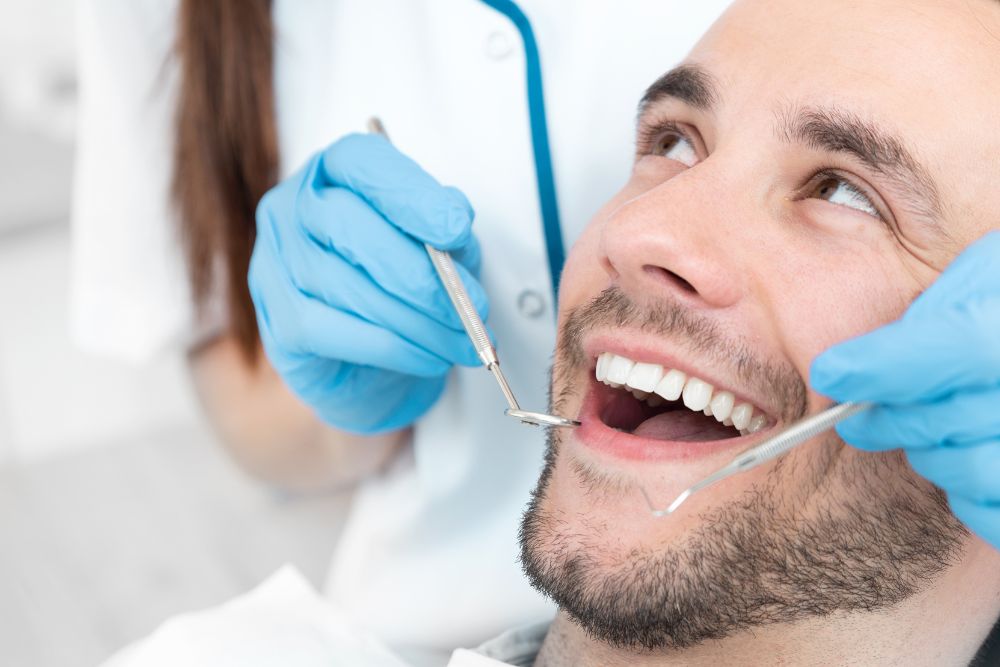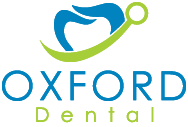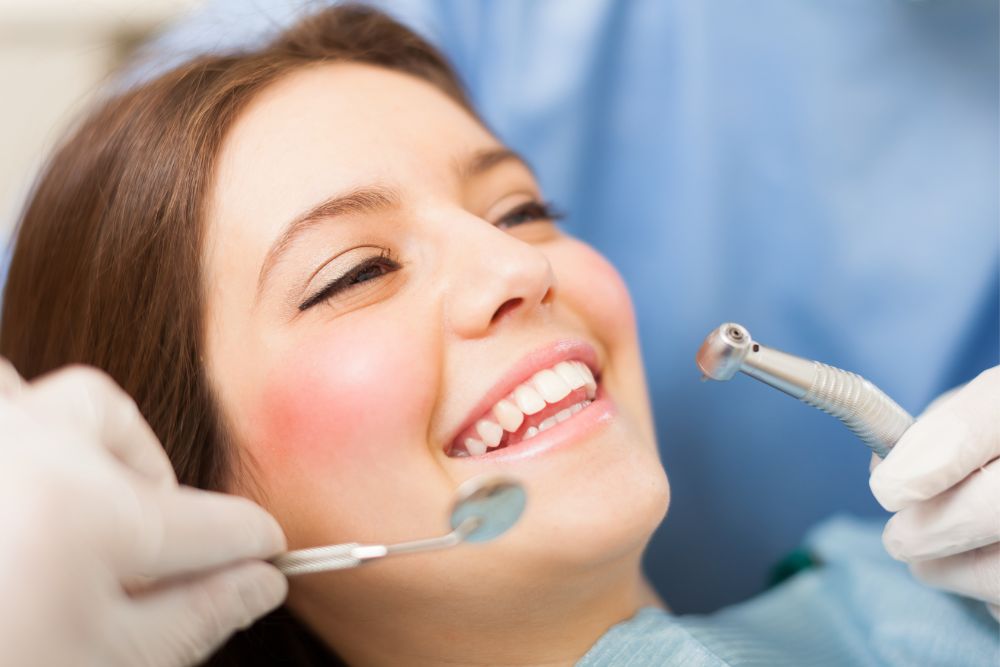Keeping up with your oral health is important for your overall well-being – and regular dental cleanings play a fundamental role.
At Oxford Dental, we offer dental cleaning services and prioritize preventative care to help our patients maintain healthy smiles for life.
Let’s take a look at the benefits of regular dental cleanings, what to expect, and how often cleanings are necessary:
Benefits of a Dental Cleaning
The benefits of dental cleanings go beyond mere cleaning of the teeth.
Teeth cleaning services play a crucial role in preventing oral health problems and detecting dental issues.
By prioritizing regular dental cleanings as part of a comprehensive oral hygiene regimen, you can enjoy optimal oral health and maintain your smiles for years to come.
Prevents Cavities, Gum Disease, and Bad Breath
One of the main benefits of teeth cleanings is that they help prevent oral health issues such as gum disease, cavities, and bad breath by removing plaque.
Plaque is a sticky film that contains bacteria and it forms on the teeth and along the gumline. If the plaque is not removed through regular brushing and flossing, it can harden and turn into tartar. This can lead to tooth decay and gum inflammation.
Dental cleaning services remove plaque and tartar buildup to reduce the risk of gum disease and tooth decay.
Contributes to a Brighter, Whiter Smile
Routine dental cleanings also contribute to a brighter, whiter smile.
Over time, various factors, such as food, beverages, and lifestyle habits, can accumulate surface stains on teeth, causing them to appear discolored or dull.
During a dental cleaning, dental professionals use specialized tools and polishing agents to remove these stains, revealing a brighter, more youthful smile.
Detects Potential Dental Issues
Dental cleanings also help your dentist detect potential dental issues.
During the cleaning process, dentists or hygienists carefully examine the teeth, gums, and surrounding oral tissues for signs of decay, gum disease, or other oral concerns.
Identifying these issues at an early stage allows your dentist to perform appropriate interventions and treatments immediately, preventing further complications and preserving oral health.
What Happens During a Dental Cleaning?
The dental cleaning procedure aims to thoroughly remove plaque and tartar, polish the teeth to a smooth finish, and enhance their strength and resistance to decay.
Here are the steps you should expect during teeth cleaning services:
1. Remove Plaque and Tartar
Dental professionals use specialized tools, such as scalers and curettes, to carefully remove plaque and tartar buildup from the surfaces of your teeth and along the gumline.
By carefully removing these deposits, dental cleanings help prevent tooth decay, gum disease, and other oral health issues.
2. Polish Teeth
After the plaque and tartar are removed, the teeth are polished using a dental polisher and a mildly abrasive polishing paste.
This process helps smooth out the tooth surfaces, making them less susceptible to plaque buildup and enhancing their appearance.
Polishing also removes surface stains caused by factors such as coffee, tea, tobacco, and certain foods, resulting in a brighter, more radiant smile.
3. Fluoride Treatment
In some cases, a fluoride treatment may be given following the cleaning process.
Fluoride is a mineral that helps strengthen the enamel, the outer layer of the teeth, making them more resistant to acid attacks from bacteria and acidic foods.
The fluoride treatment typically involves applying a fluoride gel, foam, or varnish to the teeth for a few minutes.
This helps remineralize weakened areas of enamel and provides added protection against cavities.
How Often is a Dental Cleaning Necessary?

In general, it is recommended that most individuals have a professional dental cleaning every six months.
However, some individuals may require more frequent cleanings, while others may maintain optimal oral health with less frequent visits.
Oral Health Needs
The condition of your teeth and gums, as well as your overall oral health, play a significant role in determining how often you should undergo dental cleanings.
Individuals with a history of gum disease, frequent plaque buildup, or other oral health issues may require more frequent cleanings to maintain optimal oral hygiene.
However, those with excellent oral health may only need cleanings every six months to a year.
Risk Factors
Certain factors can increase the risk of developing dental problems, necessitating more frequent cleanings.
For example, smokers, individuals with diabetes, pregnant women, and people with compromised immune systems are at higher risk of gum disease and may benefit from more frequent cleanings to manage their oral health effectively.
Also, individuals with a history of cavities or dental restorations may require closer monitoring and more frequent cleanings to prevent recurrent decay and maintain the longevity of their dental work.
Professional Recommendations
Ultimately, the recommendation for how often to undergo dental cleanings should be based on the advice of your dental professional.
Dentists and hygienists assess oral health during routine check-ups and cleanings, considering factors such as plaque buildup, gum health, and overall oral hygiene practices.
Based on their evaluation, they can recommend an appropriate cleaning schedule tailored to your specific needs and goals.
Dental Cleaning vs Teeth Whitening
While dental cleaning and teeth whitening serve complementary purposes, they are not interchangeable.
Dental cleaning is essential for maintaining oral health and preventing dental problems, while teeth whitening focuses on aesthetic enhancement.
A dental cleaning focuses on removing plaque, tartar, and surface stains from the teeth. It helps maintain optimal oral health and prevent dental problems.
Teeth whitening, on the other hand, is a cosmetic dental procedure designed to lighten teeth’s color and improve their overall appearance.
Unlike dental cleaning, which primarily addresses plaque, tartar, and surface stains, teeth whitening specifically targets stains caused by factors such as age, genetics, medication, and lifestyle habits.
Teeth whitening treatments typically involve applying bleaching agents such as hydrogen peroxide or carbamide peroxide to the teeth. These penetrate the enamel and break down stains.
This process can significantly enhance the brightness and whiteness of the teeth, resulting in a more radiant smile.
How Much is a Dental Cleaning in Edmonton?
At Oxford Dental, the cost of a dental cleaning is approximately $300.
However, it’s important to note that dental service fees may vary depending on individual factors such as oral health conditions and specific treatment needs. Factors such as frequency of visits and additional treatments may also influence the overall cost.
If you have any questions or concerns regarding your dental treatment or associated costs, we encourage you to communicate openly with your dentist.
Understanding the details of your treatment plan upfront can ensure a positive dental experience and optimal oral health outcomes.
Lifelong Oral Health: Teeth Cleaning in Edmonton
Dental cleanings are important for maintaining optimal oral health and preventing dental problems.
At Oxford Dental, we are committed to providing comprehensive dental care, including routine cleanings, to help our patients achieve and maintain healthy smiles.
We encourage you to prioritize your oral health by scheduling regular dental cleanings and consulting with our team for personalized care and guidance.
Together, we can ensure a lifetime of healthy smiles and optimal oral health.

